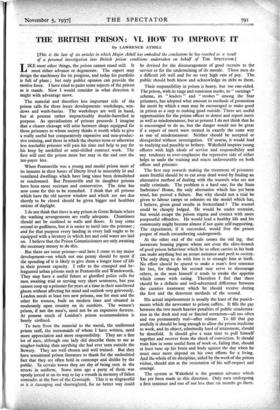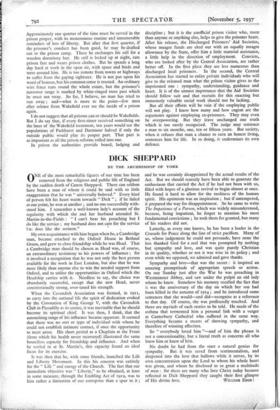THE BRITISH PRISON : VI. HOW TO EVIPROVE IT
By LAWRENCE ATHILL
[This is the last of six articles in which Major Athill has embodied the conclusions he has reached as a result of a personal investigation into British prison conditions undertaken on behalf of THE SPECTATOR.] LIKE most other things, the prison cannot stand still. It must either advance or degenerate. The expert may design the machinery for its progress, and today his portfolio is full of plans ; but only public opinion can provide the motive force. I have tried to paint some aspects of the prison as it stands. Now I would consider in what direction it might with advantage move.
The material and therefore less important side of the prison calls for three lesser developments: workshops, win- dows and wash-basins. The workshops are well in hand, but at present rather impracticably double-barrelled in purpose. As specialisation of prisons proceeds I imagine that a clearer cleavage will arise between shops equipped for those prisoners to whom society thinks it worth while to give a really useful but comparatively expensive and non-produc- tive training, and those in which the shorter-term or otherwise less teachable prisoner will pass his time and help to pay for his keep by unskilled or semi-skilled contract work. The first will cost the prison more but may in the end cost the tax-payer less.
When Pentonville was a young and model prison most of its inmates in their hours of liberty lived in miserably lit and ventilated dwellings which have long since been demolished or condemned. But Pentonville and its daughter prisons have been more resistant and conservative. The time has now come for this to be remedied. I think that all prisons which have the old narrow window and which are not due shortly to be closed should be given bigger and healthier rations of daylight.
I do not think that there is any prison in Great Britain where the washing arrangements are really adequate. Cleanliness should not be confined to walls and floors. It may come second to godliness, but it is easier to instil into the prisoner ; and for that purpose every landing in every hall ought to be equipped with a lavatory in which hot and cold water are laid on. I believe that the Prison Commissioners are only awaiting the necessary money to do this.
But there are some prisons—and here I come to my major development—on which not one penny should be spent if the spending of it is likely to give them a longer lease of life in their present capacity. I refer to the cramped and be- leaguered urban prisons such as Pentonville and Wandsworth. They may have a useful future as glorified police cells for men awaiting trial or serving very short sentences, but you cannot coop up a prisoner for years at a time in their unrelieved gloom without affecting his mind and outlook very grievously. London needs at least two new prisons, one for men and the other for women, built on modern lines and situated in moderately open country on its outskirts. The women's prison, if not the men's, need not be an expensive fortress. At present much of London's prison accommodation is barely civilised.
To turn from the material to the moral, the uniformed prison staff, the nursemaids of whom I have written, need more appreciation and more responsibility. They are a fine lot of men, although one lady did describe them to me as tougher-looking than anything she had ever seen outside the Bowery. They are well chosen and well trained. But they have sensational prison literature to thank for the undoubted fact that they are often held in contempt and dislike by the public. In certain towns they are shy of being seen in the streets in uniform. Some time ago a party of them was openly jeered at on its way to lay a wreath in memory of fallen comrades at the foot of the. Cenotaph. This is as disgraceful as it is damaging and shortsighted, for no better way could be devised for the discouragement of good recruits to the service or for the undermining of its morale. These men do a difficult job well and for no very high rate of pay. The public should both know and acknowledge its debt to them.
Their responsibility in prison is heavy, but too one-sided. The prison, with its stage and remission marks, its " earnings " scheme, its " leaders " and " strokes " among the Star prisoners, has adopted what amount to methods of promotion for merit by which a man may be encouraged to make good in prison as a step to making good outside. There are useful opportunities for the prison officer to detect and report merit as well as misdemeanour, but at present I do not think that he is encouraged to do so, but the danger would not be great if a report of merit were treated in exactly the same way as one of misdemeanour. Neither should be accepted or disregarded without investigation. Of course, it would lead to toadying and possibly to bribery. Wakefield inspires young officers with high ideals of service and responsibility and any tendency to over-emphasise the repressive side of either helps to undo the training and reacts unfavourably on both officer and prisoner.
The first step towards making the treatment of prisoners more fruitful should be to cut away dead wood by finding an alternative method of dealing with the wastrels who are not really criminals. The problem is a hard one, for the State Inebriates' Home, the only alternative which has yet been tried, has proved a failure. But why should not a trial be given to labour camps or colonies on the model which has, I believe, given good results in Switzerland ? The wastrel could be cheaply lodged. He would be under restraint, but would escape the prison stigma and contact with more purposeful offenders. He would lead a healthy life and his community might become almost if not quite self-supporting. The experiment, if it succeeded, would free the prison proper of much encumbering undergrowth.
At the other end of the scale comes the old lag, that inveterate homing pigeon whom not even the olive-branch of good prison behaviour which he so often carries in his beak can make anything but an arrant nuisance and peril to society. The only thing to do with him is to strangle him at birth. No effort should be spared to make a man's first sentence his last, for though his second may serve to discourage others, in the man himself it tends to awake the appetite which comes with eating. Therefore I feel that there should be a definite and well-advertised difference between the curative treatment which he should receive during the first and the deterrent methods of the second.
His actual imprisonment is usually the least of the punish- ments which the newcomer to prison suffers. It fills the gap between the two much heavier penalties of public condemna- tion in the dock and real or fancied ostracism—all too often and too permanently real—after release. To fill that gap usefully it should be long enough to allow the prison medicine to work, and its object, admittedly hard of attainment, should be threefold. It should give a man time to pull himself together and recover from the shock of conviction. It should train him in some useful form of work or, failing that, should at least tune up his brain and body against the day when he must once more depend on his own efforts for a living. And the whole of its discipline, aided by the work of the prison visitor, should aim at the restoration of his self-respect and courage.
The system at Wakefield is the greatest advance which has yet been made in this direction. Only men undergoing a first sentence and one of not less than six months go there. Approximately one quarter of the time must be served in the prison proper, with its monotonous routine and innumerable reminders of loss of liberty. But after that first quarter, if the prisoner's conduct has been good, he may be drafted out to the prison camp. There he exchanges his cell for a wooden dormitory hut. He still is locked up at night, eats prison fare and wears prison clothes. But he spends a long day hard at work in the open air, with space and birds and trees around him. He is too remote from towns or highways. to suffer from the gaping sightseer. He is not put upon his word of honour, but his common sense is trusted. An ordinary wire fence runs round the whole estate, but the prisoner's narrower range is marked by white-ringed trees past which he must not stray. So far, I believe, no man has tried to run away ; and—what is more to the point—few men after release from Wakefield ever see the inside of a prison again.
I do not suggest that all prisons can or should be Wakefields. But I do say that, if every first-timer received something on the lines of the Wakefield treatment, ten years would see the populations of Parkhurst and Dartmoor halved if only the outside public would play its proper part. That part is as important as all the prison reforms rolled into one.
In prison the authorities provide board, lodging and discipline ; but it is the unofficial prison visitor who, more than anyone or anything else, helps to give the prisoner heart. After his release, the Discharged Prisoners' Aid Societies, whose meagre funds are eked out with an equally meagre allowance by the State, offer him a little material assistance, a little help in the direction of employment. Convicts, who are looked after by the Central Association, are rather better off. In the first place they are less numerous than discharged local prisoners. ' In the second, the Central Association has started to enlist private individuals who will give to the released man what the prison visitor gives to the imprisoned one : sympathy, understanding, guidance and heart. It is of the utmost importance that the Aid Societies should follow suit and that recruits for this exacting but immensely valuable social work should not be lacking.
But all their efforts will be vain if the employing public will not play. I know how many and how cogent are the arguments against employing ex-prisoners. They may even be overpowering. But they leave unchanged one truth which is too rarely recognised. The judge may sentence a man to six months, one, ten or fifteen years. But society, when it refuses that man a chance to earn an honest living, sentences him for life. In so doing, it undermines its own defence.















































 Previous page
Previous page